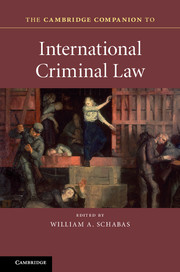Book contents
- Frontmatter
- Dedication
- Contents
- List of contributors
- List of abbreviations
- Introduction
- PART I PURPOSES AND PRINCIPLES
- PART II INSTITUTIONS
- 6 Ad hoc international criminal tribunals (Yugoslavia, Rwanda, Sierra Leone)
- 7 The International Criminal Court
- 8 National jurisdictions
- 9 The United Nations Security Council and international criminal justice
- PART III CRIMES
- PART IV TRIALS
- PART V THE FUTURE
- Index
- References
9 - The United Nations Security Council and international criminal justice
from PART II - INSTITUTIONS
Published online by Cambridge University Press: 05 December 2015
- Frontmatter
- Dedication
- Contents
- List of contributors
- List of abbreviations
- Introduction
- PART I PURPOSES AND PRINCIPLES
- PART II INSTITUTIONS
- 6 Ad hoc international criminal tribunals (Yugoslavia, Rwanda, Sierra Leone)
- 7 The International Criminal Court
- 8 National jurisdictions
- 9 The United Nations Security Council and international criminal justice
- PART III CRIMES
- PART IV TRIALS
- PART V THE FUTURE
- Index
- References
Summary
For almost the first half-century since its creation under the United Nations Charter in 1945, the United Nations Security Council spent relatively little of its time focusing on matters of international criminal justice. The Security Council is first and foremost the guardian of international peace and security under the Charter. It has attempted to fulfil that responsibility during a long and controversial history of mandating compliance with international law, imposing economic sanctions to coax recalcitrant nations towards acceptable behaviour, setting up peacekeeping operations to facilitate implementation of peace settlements or to defuse violent stand-offs between warring parties, and approving peace enforcement actions that might delegate to national military combat forces the task of intervening in an armed conflict or humanitarian calamity with the aim of ending it.
Original intent
One would be hard pressed to find anything, even inferentially, in the travaux préparatoires, or negotiating records, of the United Nations Charter – either at Dumbarton Oaks in 1944 or San Francisco one year later – that points to establishing the Security Council for the purpose of building international criminal tribunals or using judicial tools to compel compliance by individuals (of whatever allegiance). Rather, as with its predecessor, the Permanent Court of International Justice under the League of Nations, the International Court of Justice was conceived as the UN Charter's instrument of judicial remedies. But the jurisdiction of the International Court of Justice is directed towards the conduct of UN Member States and their governments and thus entails State responsibility. Absent is the typically domestic task of criminal justice that disciplines individuals for well-defined and actionable crimes. One may safely assume, based on any evidence to the contrary, that as the Second World War came to a close and the United Nations emerged from that global war's massive assault on humankind, the idea of using the Security Council to promote international criminal justice simply had not registered with the founders of the United Nations.
Soon, however, the United Nations International Law Commission, responding to a request by the General Assembly, adopted the Nuremberg principles in 1950, thus confirming that there was broad international endorsement of the illegality of atrocity crimes, namely, genocide, crimes against humanity, and serious war crimes following the Nuremberg military tribunal trials.
- Type
- Chapter
- Information
- The Cambridge Companion to International Criminal Law , pp. 178 - 196Publisher: Cambridge University PressPrint publication year: 2016
References
- 1
- Cited by



